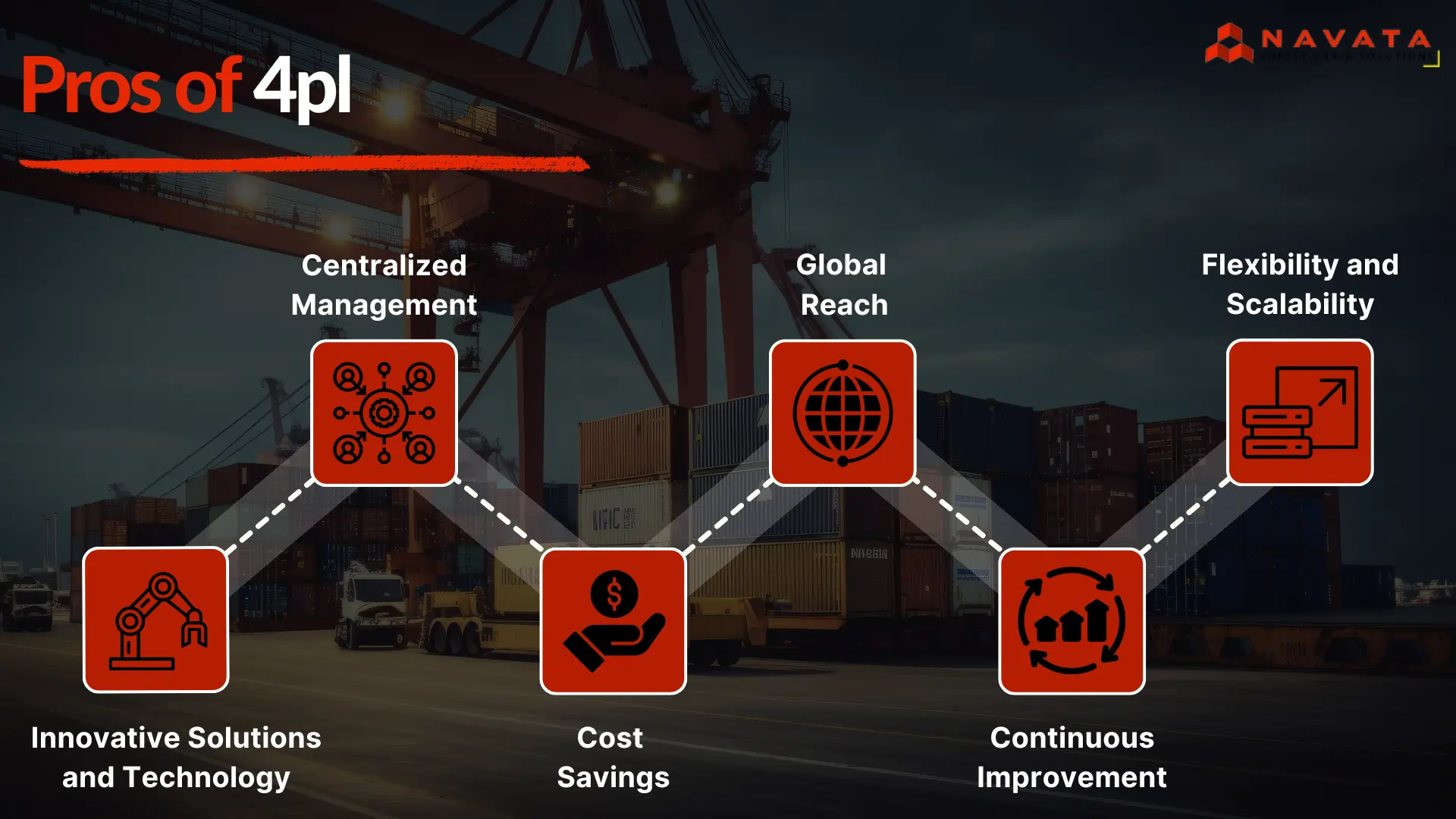Pros and Cons of 4PL
Today, 4PL Fourth party logistics is transforming how organizations manage their supply chains. Outsourcing has become the go-to answer for organisations. It helps them streamline processes and remain competitive. It is an expansion of the classic 3PL concept. Unlike 3PL, which tackles particular activities, 4PL manages the complete supply chain process. 4PL Fourth party logistics providers offer a comprehensive approach to supply chain management, integrating all aspects of logistics into a cohesive strategy. But is 4PL the right choice for your business?
In this blog post, we will look more into Pros and Cons of 4PL. So, let us get started!
Pros of 4PL (Fourth Party Logistics)
Innovative Solutions and Technology
These logistics companies are highly investing in cutting-edge technology and novel solutions to improve supply chain procedures. Businesses that work with these companies gain access to advanced tools such as real-time tracking systems, data analytics, automation, and AI-driven insights. These types of technologies increase visibility throughout the supply chain allowing firms to precisely track shipments and inventory. Companies that use better data and predictive analytics make more informed decisions.
Furthermore by using effective route optimization strategies can find areas for improvement. This helps organizations to be competitive, responsive, and efficient in an ever-changing market scenario.
Centralized Management
By outsourcing the whole supply chain to a single Fourth Party Logistics company Businesses can achieve seamless coordination and management of logistical activities. This strategy improves communication and ensures that all areas of the supply chain from procurement to delivery are controlled in a seamless manner. It removes the difficulties and inefficiencies that come with working with multiple logistics providers, resulting in more consistent and effective operations.
Furthermore, having a single point of contact allows businesses to more easily adopt strategies, monitor performance, and make modifications as needed. This results in better overall supply chain performance.
Cost Savings
By outsourcing logistics to Fourth Party Logistics providers businesses can streamline their operations and drastically lower overhead expenses. Using their knowledge in process optimization and resource management, 4PLs may identify inefficiencies and implement cost-cutting strategies. They negotiate better carrier costs, optimize shipping routes, and enhance inventory management. Businesses not only save money but also improve operational efficiency allowing, them to move more resources to core activities and strategic projects.
Global Reach
Many 4PLs have a global network of warehouses and transportation partners, which allows businesses to broaden their reach and consumer base. Using these networks, businesses can circumvent complex customs restrictions and optimize transit routes. This global infrastructure enables efficient and successful international operations, permitting easier entry into new markets and improved global supply chain management.
Continuous Improvement
Fourth Party Logistics providers implement robust performance measurement systems to track key metrics and KPIs. By analyzing these metrics, they identify areas for improvement and initiate measures to enhance supply chain efficiency. This continuous evaluation and adjustment process ensures ongoing optimization and drives better performance across the entire logistics network.
Flexibility and Scalability
Businesses can adjust their operations based on market fluctuations, such as expanding operations during peak seasons or scaling down during slower periods. Fourth Party Logistics providers are adept at adapting their services to meet these changing needs efficiently. This flexibility allows businesses to optimize their supply chain operations and respond swiftly to market demands, ensuring continuity and efficiency in their logistics strategies.

Cons of 4PL (Fourth Party Logistics)
Reduced Control
Businesses may struggle to maintain control and influence over important decisions and day-to-day operations. This can lead to a reliance on the 4PL’s processes and standards which may not always match with the company’s specific needs or strategic objectives. Communication barriers and priorities can further challenge maintaining the desired level of control and response.
Complexity and Costs
Implementing a Fourth Party Logistics (4PL) solution can be quite complicated and more expensive. This is because 4PLs handle more aspects of the supply chain, requiring careful planning and coordination across different locations and partners. It involves investing in technology and infrastructure to manage everything smoothly.
Security and Confidentiality Concerns
When you outsource to a Fourth Party Logistics (4PL) provider you’re sharing sensitive details about your operations, suppliers, and customers. It’s crucial to ensure this information is secure. Businesses must carefully consider where and how their data is handled and transmitted. Without strong assurances, there’s a risk that sensitive data may not be properly protected.
Choosing Concerns
Not all Fourth Party Logistics (4PL) providers are the same. Each may specialize in different industries or focus on specific regions which can significantly impact their suitability for your business. It’s important to choose a 4PL provider who aligns with your industry requirements and can meet your specific logistical needs effectively.
You may also like to read : What is Fourth Party Logistics (4PL)?

Conclusion
4PL offers significant benefits like advanced technology, centralized management, cost savings, global reach, continuous improvement, and flexibility in scaling operations. These advantages can help businesses streamline their supply chains expand globally, and stay competitive in markets. Outsourcing to a 4PL also poses challenges such as reduced control over operations, complexity in implementation, higher costs, and concerns about data security and provider selection.
Businesses should carefully check these pros and cons based on their specific needs and industry requirements. Choosing 4PL provider and establishing clear communication and security protocols, organizations can effectively leverage 4PL services to enhance efficiency and profitability. Ultimately whether 4PL is the right choice depends on how it aligns with a company’s goals and its ability to manage the associated risks effectively.
Thanks For Reading: Pros and Cons of 4PL
Powered By 360Presence


1 Comment